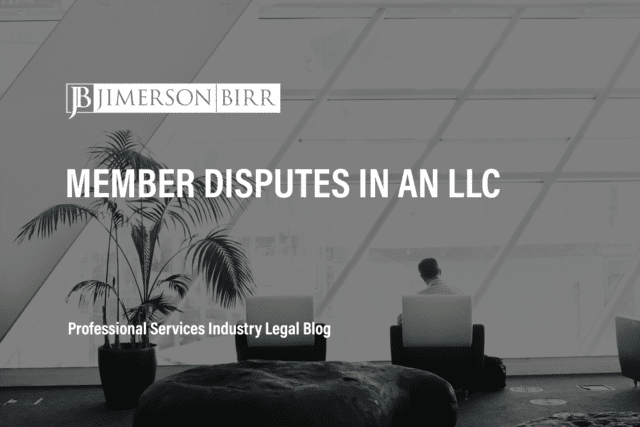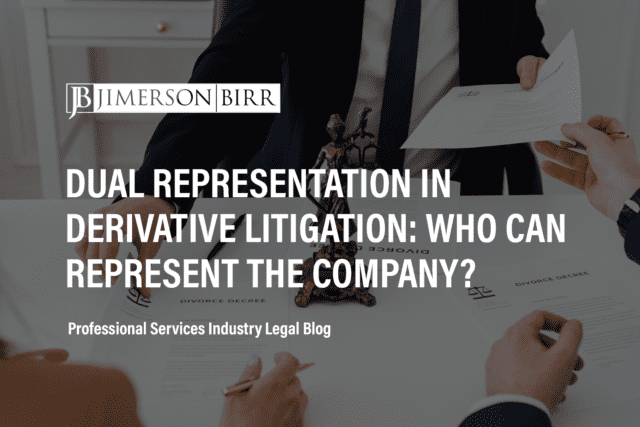What are buy-sell agreements?
Buy-sell agreements are legally binding contracts between co-owners of a business that govern what happens if one of the co-owners wants or needs to sell their ownership interest. These agreements establish a predetermined process for the sale of an owner’s interest in the company, such as in the case of retirement, disability, or death.
Buy-sell agreements typically address essential questions, such as:
- Who can buy the departing owner’s share of the business?
- How will the sale price be determined?
- How will the purchase be financed?
- What are the terms of payment?
- What happens if the remaining co-owners can’t agree on the terms of the sale?
By answering these questions in advance, buy-sell agreements help avoid conflicts and provide a clear roadmap for transferring ownership. They also help ensure that the departing owner receives fair value for their ownership interest and that the remaining co-owners maintain business control.
Need help with a matter related to buy-sell agreements? Schedule your consultation today with a top shareholder disputes and derivative litigation attorney.
In Florida, which laws and regulations apply to buy-sell agreements?
In Florida, buy-sell agreements follow the state’s contract law, generally found in Chapters 680 through 688 of the Florida Statutes. Specifically, buy-sell agreements fall under “agreements for the purchase and sale of goods,” which Chapter 672 of the Florida Statutes covers.
For example, if the business is a corporation, then the Florida Business Corporation Act governs the ability of shareholders to enter into agreements governing the sale of their shares. In addition, the Florida Revised Limited Liability Company Act governs LLCs in Florida. It allows LLC members to enter into operating agreements that can include provisions related to buy-sell agreements. Finally, the Florida Revised Uniform Partnership Act provides the statutory framework for partnerships in Florida, including conditions associated with the sale of a partner’s interest in the partnership.
In addition, other state and federal laws and regulations could impact buy-sell agreements, depending on the nature of the business and the terms of the agreement.
What are common issues regarding buy-sell agreements that lead to litigation?
There are several issues regarding buy-sell agreements that can lead to litigation. Some of these include:
- Valuation disputes: One of the most common issues related to buy-sell agreements is determining the value of the business or ownership interest being sold. Disputes can arise over the valuation method used, the appraiser’s qualifications, or the appraisal’s validity.
- Financing disputes: If the buy-sell agreement provides for the financing of the sale, disputes can arise over the financing terms or the buyer’s ability to obtain financing. These disputes generally include issues related to interest rates, payment terms, and collateral.
- Triggering events: Disputes can arise over whether a triggering event requires the sale of the ownership interest. For example, there may be a disagreement over whether an owner has become disabled, retired, or has breached the terms of the agreement.
- Failure to follow the terms of the agreement: Disputes can arise when one party fails to follow the terms of the buy-sell agreement. For example, a party may fail to provide notice of their intent to sell, comply with the valuation process, or complete the sale promptly.
- Lack of clarity or ambiguity in the agreement: Ambiguity in the terms of the buy-sell agreement can lead to disputes over interpretation. The price and terms of the sale, the triggering events, and the process for resolving disputes are all familiar sources of ambiguity.
It’s essential to draft a comprehensive and clear buy-sell agreement that addresses all potential contingencies and provides a transparent dispute resolution process. Otherwise, the above issues will likely take root.
When a set of facts is appropriate to meet the requirements giving rise to problems with buy-sell agreements, there are many paths a claimant may take. We are value-based attorneys at Jimerson Birr, which means we look at each action with our clients from the point of view of costs and benefits while reducing liability. Then, based on our client’s objectives, we chart a path forward to seek appropriate remedies.
To determine whether your unique situation may necessitate litigation, please contact our office to set up your initial consultation.
What evidence does a plaintiff generally need to file a lawsuit regarding buy-sell agreements?
To successfully file a lawsuit regarding buy-sell agreements, a plaintiff must provide evidence to support their claims, including the following:
- The buy-sell agreement: The plaintiff will need to provide a copy of the buy-sell agreement and demonstrate how the defendant violated the terms of the agreement.
- Communications between the parties: The plaintiff may need to provide evidence of communications between the parties that demonstrate a breach of the buy-sell agreement or a failure to follow the agreed-upon process.
- Valuation reports: If there is a dispute over the value of the business or ownership interest being sold, the plaintiff may need to provide a valuation report or other evidence to support their valuation.
- Financial records: The plaintiff may need to provide financial records or other evidence to support their financing or payment terms claims.
To see what actions or defenses may be available for your unique situation, please contact our office to set up your initial consultation.
Frequently Asked Questions
- Why is a buy-sell agreement important?
A buy-sell agreement is essential because it provides a straightforward process for selling an owner’s interest in the business in the event of specific triggering events, such as death, disability, or retirement. Without a buy-sell agreement, disputes can arise over the value of the business and the terms of the sale, leading to costly and time-consuming litigation.
- What provisions should be in a buy-sell agreement?
A buy-sell agreement should include provisions related to the triggering events that require a sale, the price and terms of the deal, and the process for completing the sale. It should also include financing, valuation, and dispute resolution provisions.
- How is the value of the business or ownership interest determined in a buy-sell agreement?
The value of the business or ownership interest is typically determined through a valuation process. This process may involve hiring an independent appraiser to value the business or using a predetermined formula to calculate the value.
- Can a buy-sell agreement be amended?
A buy-sell agreement is amenable if all parties agree to the changes. It’s important to follow the procedures for amending the agreement outlined in the original agreement to ensure the amendment is valid.
- Do all businesses need a buy-sell agreement?
Not all businesses need a buy-sell agreement, but these agreements are most useful for companies with multiple owners or partners. A buy-sell agreement can help prevent disputes and ensure a smooth ownership transition in the event of specific triggering circumstances.
Have more questions about a buy-sell agreements-related situation?
Crucially, this overview of buy-sell agreements does not begin to cover all the laws implicated by this issue or the factors that may compel the application of such laws. Every case is unique, and the laws can produce different outcomes depending on the individual circumstances.
Jimerson Birr attorneys guide our clients to help make informed decisions while ensuring their rights are respected and protected. Our lawyers are highly trained and experienced in the nuances of the law, so they can accurately interpret statutes and case law and holistically prepare individuals or companies for their legal endeavors. Through this intense personal investment and advocacy, our lawyers will help resolve the issue’s complicated legal problems efficiently and effectively.
Having a Jimerson Birr attorney on your side means securing a team of seasoned, multi-dimensional, cross-functional legal professionals. Whether it is a transaction, an operational issue, a regulatory challenge, or a contested legal predicament that may require court intervention, we remain a tireless advocate every step of the way. Being a value-added law firm means putting the client at the forefront of everything we do. We use our experience to help our clients navigate even the most complex problems and come out the other side triumphant.
If you want to understand your case, the merits of your claim or defense, potential monetary awards, or the amount of exposure you face, you should speak with a qualified Jimerson Birr lawyer. Our experienced team of attorneys is here to help. Call Jimerson Birr at (904) 389-0050 or use the contact form to schedule a consultation.

We live by our 7 Superior Service Commitments
- Conferring Client-Defined Value
- Efficient and Cost-Effective
- Accessibility
- Delivering an Experience While Delivering Results
- Meaningful and Enduring Partnership
- Exceptional Communication Based Upon Listening
- Accountability to Goals











